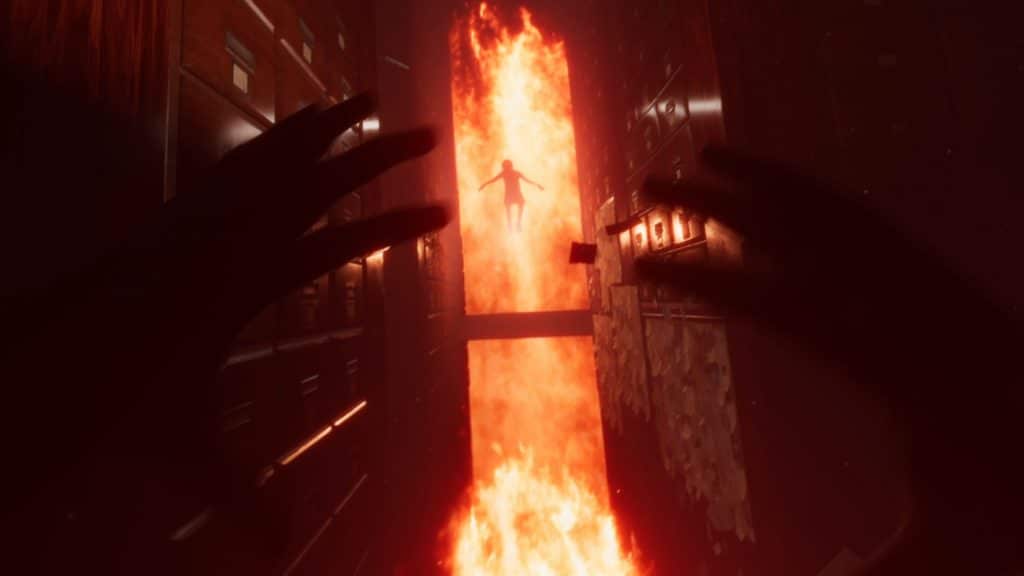What can I tell you about Hinge? Well, it’s absolutely gorgeous, depicting an eery early 20th Century hotel stolen away to a strange dimension, its otherworldy glows piercing through enormous windows. Undoubtedly, it’s one of the best-looking experiences you’ll see in VR this year.
Other than that? Well, it’s a little tricky to actually say. You can see from this month’s fantastic gameplay trailer, at least, that developer Arcadia clearly knows what it wants Hinge to be; a surrealist horror that moves at an unpredictable pace with enemies that play to VR’s strengths. Actually playing the game, though, shows something that isn’t quite there yet.
Hinge’s demo — which from what I understand is a slice of the full first episode releasing tomorrow — doesn’t give you all that much context. The thick accent of your protagonist (whom I gather is a police officer and an uninvited guest) perfectly channels 40’s Hollywood stars like Fred MacMurray and Humphrey Bogart, and your backstory appears to be pieced together by flashbacks from touching items in the world. But other than that there’s little direction when you’re dropped into one of the hotel suites and dare to open the doors beyond. It’s up to you to piece it all together.
And, in a lot of ways, that’s part of the game’s lure. I can honestly say that something unpredictable lies behind almost every door I opened in the 90 or so minutes I’ve spent with Hinge. Most of the time you’ll be met with stunning set dressing, some of which is interactive, but nasty surprises hide around the corners. Beastly enemies lie in wait, sometimes lashing out with tentacles clinging to the ceiling and at others appearing literally from thin air. Some particularly cruel monsters disguise themselves as other objects and choose the right time to jump out too.
The enemy designs and principles themselves are sound and would work to great effect were there better parameters to define how to win and lose in Hinge. Sometimes I appeared to ‘fail’, which results in being teleported back to the original room, without actually being able to tell if I was being attacked from any angle. Worse yet, one enemy that patrols the corridors of a larger room seemed to get stuck on the ceiling as he lumbered about, turning his initially squeamish appearance into something of a parody. Plus getting close to enemies also causes the world to shake and judder which, while certainly atmospheric (at least for the first few times) is a pretty unpleasant effect inside VR.
This system can also make it exhausting to make much progress. I found myself respawning and then making a mad dash for a set of door keys with little concern for tactics, simply because I didn’t know how the game really wanted me to tackle a given situation. It reaches an infuriating brick wall with a recurring maze section that I seemed to tour endlessly without getting anywhere. Perhaps there was a method to proceeding that I missed, but the dark and gloomy environments in this section didn’t encourage much exploration and proved the last straw, at least for me.
The game also really struggled on PCs running a GTX 1080 and a 2060 Super, which — as with any PC experience — might just be something I encounter but something tells me the ambition behind an environment that seems to be ever-shifting as you move about it may be taking its toll. Certainly, opening doors to a black abyss that signaled the environment hadn’t loaded up yet, or making several steps into the next room before any items spawn suggests that Hinge could do with some optimization; I’d soon exchange some of its super crisp textures for a little more stability or happily break immersion with a few seconds of loading times if my gameplay experience went uninterrupted.
But there is something here because Hinge has some wonderful ideas. Pop a cigarette in your mouth, light it up and a cloud of smoke seamlessly teleports you to what looks like a Twin Peaks-inspired safe space to review the story so far. Early on I find a two-pronged fork that rings out whenever it makes contact with the environment and, though I only ever found a single use for it, it was undeniably satisfying to strike against a surface. All of this, from the enemies to the surprises, suggests that there’s a great game hiding in the demo for Hinge – it just needs a little more spit n’ shine to come to fruition.
Hinge, in its current form, may just be a bit too ambitious for its own good. Certainly, at least, it’s a bit too ambiguous. Again, I played a demo of what’s releasing tomorrow, not the finished article, so I’ve got my fingers crossed that the full first episode releases in better shape. As it stands, though, I think Hinge needs a little more work before it’s ready for prime time. Nonetheless, we’ll be looking to bring you final impressions of Episode 1 asap.







